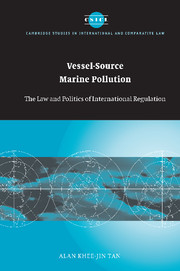Book contents
- Frontmatter
- Contents
- Foreword
- Preface
- Table of Conventions
- Table of European Union Instruments
- Table of IMO Resolutions and Guidelines
- Table of Miscellaneous Instruments
- Table of Domestic Legislation
- Table of Cases (International Courts and Tribunals)
- Abbreviations
- Part A The Regulation of Vessel-Source Pollution in its Eco-Political Context
- 1 Vessel-Source Pollution, the Ecological Imperative and the Compliance Problem
- 2 The Dynamics of the Law-Making Process: Actors, Arenas and Interests
- Part B Vessel-Source Pollution and the International Legislative Process
- Part C The Future of Regulation
- Bibliography
- Index
- CAMBRIDGE STUDIES IN INTERNATIONAL AND COMPARATIVE LAW
1 - Vessel-Source Pollution, the Ecological Imperative and the Compliance Problem
Published online by Cambridge University Press: 24 July 2009
- Frontmatter
- Contents
- Foreword
- Preface
- Table of Conventions
- Table of European Union Instruments
- Table of IMO Resolutions and Guidelines
- Table of Miscellaneous Instruments
- Table of Domestic Legislation
- Table of Cases (International Courts and Tribunals)
- Abbreviations
- Part A The Regulation of Vessel-Source Pollution in its Eco-Political Context
- 1 Vessel-Source Pollution, the Ecological Imperative and the Compliance Problem
- 2 The Dynamics of the Law-Making Process: Actors, Arenas and Interests
- Part B Vessel-Source Pollution and the International Legislative Process
- Part C The Future of Regulation
- Bibliography
- Index
- CAMBRIDGE STUDIES IN INTERNATIONAL AND COMPARATIVE LAW
Summary
Overview
The protection of the marine environment has become one of the most important ecological issues of modern times. Indeed, it forms part of that general emergence of environmental consciousness which has captured world attention in the past five decades or so and which figures so prominently in the politics of international discourse today. The sources of human-induced marine pollution are numerous – these include discharges from land-based sources, ships, atmospheric deposition, ocean dumping and offshore oil and gas installations. This work is concerned with the regulation of vessel-source marine pollution, i.e. pollution of the sea emanating from both deliberate as well as accidental discharges by ocean-going ships.
In the past few decades, international, regional and national regulation over shipping matters such as navigational safety, vessel-source pollution and maritime security have grown to such an extent that the global shipping industry today faces a litany of costly regulatory rules. Consequently, the shipowner's traditional right of free navigation is presently qualified by important imperatives such as the protection of the marine environment and the promotion of maritime safety. In particular, the emphasis on marine pollution control by concerned coastal and port states has come to substantially erode the traditional right of free navigation accruing to maritime states and their shipping interests.
Despite the proliferation of regulations over shipping, many international instruments which prescribe pollution control measures are still not effectively enforced and adhered to.
- Type
- Chapter
- Information
- Vessel-Source Marine PollutionThe Law and Politics of International Regulation, pp. 3 - 28Publisher: Cambridge University PressPrint publication year: 2005

